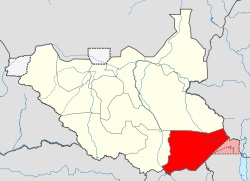MPs hold public hearing on early marriage, child abuses
December 14, 2013 (TORIT) – National lawmakers from South Sudan’s Eastern Equatoria state on Friday held a public hearing on key issues affecting the region, which mainly included, early and forced marriage, child abuse and children lacking parental care.

Scopas Taban, the delegation team leader told Sudan Tribune that the hearing brought on board all stakeholders to discuss a positive way forward for the benefits of all the country’s citizens.
He said a similar initiative was undertaken in the rest of the country’s 10 states, and involved widespread consultations with all the relevant authorities and citizens on issues affecting their region.
“Issues of early and forced marriages are eminent in almost all the 10 states of South Sudan. We want to come up with a bill that will help us control the practice which is running out of hand”, Taban said.
The purpose of the data collection is to enhance the parliamentary specialised committee for gender to draft a private members bill on early and force marriage and also to enable them amend the Child Act, 2008, he added.
Over 100 citizens from the state took part in the one-week public hearing, which saw early and forced marriages take center stage during discussions among the various stakeholders.
The bill, lawmakers argued, would help the new nation move forward like any other developing countries, if passed.
Some attendee, during the hearing, strongly advocated for the abolition of bride price payment and requested the country’s national assembly to pass a law forbidding the practice.
“We need laws that may help us to deal with issue of bride price, if the government cares about its citizens, why is South Sudan, other countries are very clear on this issue of bride price”, said a participant, only identified as Dina.
Lawmakers should quickly pass bills and policies against these issued we are discussing so that our citizens are not exploited, she stressed.
Less than 50 percent of the South Sudanese, statistics show, have access to basic healthcare, meaning the new nation has one of the lowest health indicators in the world.
(ST)
